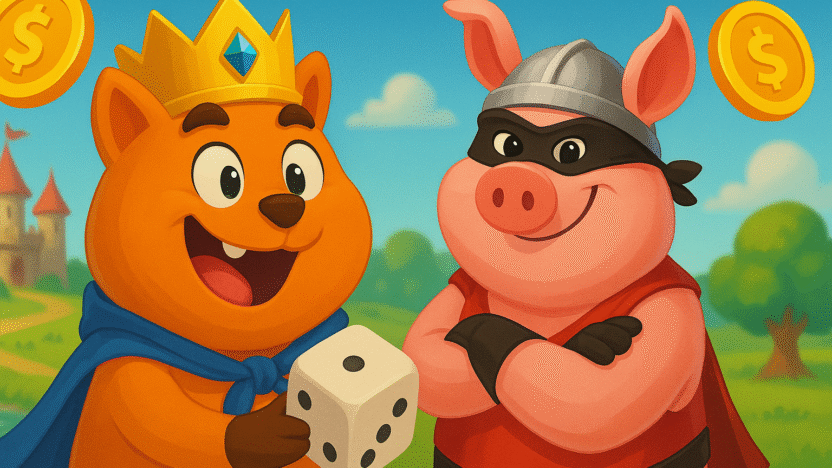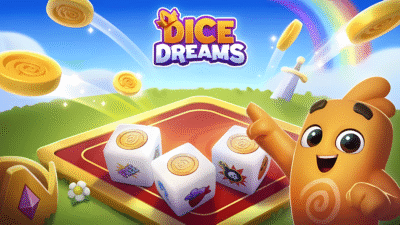You know the ritual. It’s 11 PM, you’ve finished your work, binged the latest show, and now you’re endlessly scrolling through the app store. You’re searching for it. Not just a game, but a new digital home. A new obsession. A world where you can build, conquer, and maybe, just maybe, exact a little sweet revenge on your friends for that thing they said last weekend.
In the grand kingdom of casual mobile games, one name has reigned supreme for years, a titan casting a long shadow: Coin Master. It’s the OG, the one your aunt probably plays, a behemoth of spins and raids that defined a genre.
But recently, a challenger has emerged from the mist, sword drawn and dice in hand. Dice Dreams. It’s slick, it’s cinematic, and it’s slowly seducing players away from the classic slot machine with its charming board game aesthetic.
Both games promise the same intoxicating loop: earn gold, build your village, attack your friends, and collect shiny things. Both will fill your phone with notifications and your brain with dopamine. But for a dedicated player in 2025—a true grinder who analyzes every reward and optimizes every move—which one is actually worth your precious time and energy? Which game truly rewards your strategic mind and your thirst for loot?
Pour a drink, settle in, and cancel your morning plans. We’re about to put these two giants under a microscope in a 5000-word deep dive to settle the score once and for all. This is Dice Dreams vs. Coin Master. Let the showdown begin.
Part 1: The Core Mechanic – The Soul of the Game
At their heart, both games are about one thing: a core action you repeat thousands of time to get resources. The “feel” of this action is everything. It’s the difference between a satisfying obsession and a tedious chore.
Coin Master: The Primal Thrill of the Slot Machine
Coin Master’s core is pure, unadulterated, and brutally effective: a three-reel slot machine. There’s no pretense here. You press a big red button that says “SPIN,” and you watch the reels fly. The psychology is ancient and powerful. It taps into the same part of your brain that loves bubble wrap and scratching lottery tickets.
The magic of the slot is its simplicity. You don’t have to think. You just pull the digital lever. Match three pigs in bandanas? You get to attack. Match three coin bags? You get a pile of gold. Match three energy capsules? You get more spins. It’s a direct, instant feedback loop. There is no journey, only the result. It’s a shot of pure RNG adrenaline, and for millions of players, it’s irresistibly addictive. It’s the digital equivalent of a chakna box – you never know what you’re gonna get, but you keep reaching for more.
Dice Dreams: The Illusion of a Journey
Dice Dreams takes a different approach. Instead of a static slot machine, it presents you with a game board. You roll two dice, and your little character token moves around the board, landing on different tiles.
Is it still based on random numbers? Absolutely. But the presentation creates an illusion of a journey. You see yourself progressing around the board. You anticipate landing on that juicy ‘Steal’ tile that’s just a few spaces away. This simple act of wrapping the RNG in a board game format adds a layer of perceived strategy and engagement. You’re not just pulling a lever; you’re navigating a path. The animations are slicker, the world feels more dynamic, and your actions have a sense of movement and consequence that the static slot machine lacks.
The Verdict on the Core Mechanic
This comes down to personal taste and what you’re looking for in a brain-off activity.
- Coin Master is for the purist. It’s a direct, no-frills dopamine dispenser. If you love the raw, unadulterated thrill of a slot machine and the massive potential jackpots that come with it, Coin Master’s core is hard to beat. It’s a classic for a reason.
- Dice Dreams is for the player who wants a little more immersion. The board game mechanic, while still random, makes the experience feel more like a “game” and less like a gambling simulator. The added cinematic flair makes each roll feel a bit more eventful.
For long-term engagement, Dice Dreams arguably has the edge. The journey around the board provides a little more variety to the core loop, which can help stave off the monotony that can eventually set in with Coin Master’s single-minded spin button.
Winner: Dice Dreams (by a hair, for engagement)
Part 2: The Art of the Attack – Bringing the Pain
The entire point of these games is the social conflict. Building your village is just the setup. Tearing down someone else’s is the punchline.
Coin Master: Hammer Time!
When you line up three Hammer symbols in Coin Master, you get to attack. The game presents you with a target—either a random player or a friend on your revenge list—and you simply tap their village. A giant hammer comes down from the sky and smashes one of their buildings. If they have a shield, it’s blocked. If not, you get a handsome sum of coins.
It’s simple, direct, and functional. The feeling of power is there, but it’s a bit impersonal. You tap, a hammer falls, you get paid. Next.
Dice Dreams: Peon-Powered Artillery
Dice Dreams, true to its cinematic nature, makes attacks a bit more of a spectacle. When you land on the cannon tile, you’re taken to your opponent’s village. You see your own little Peons load up a giant cannon, take aim, and fire a cannonball that soars across the screen and demolishes a building.
The result is the same—a damaged building and a coin reward—but the presentation is far more engaging. It feels less like a random event and more like you are actively commanding an attack.
The Revenge System: Where It Gets Personal
Both games feature a revenge system, but their implementation differs slightly, which makes a world of difference.
- In Coin Master, your revenge list is just another option in your attack menu. It feels a bit detached, just another name on a list.
- In Dice Dreams, the “Log” is front and center. You see a clear, chronological feed of who attacked you, complete with their profile picture and a big, beautiful “Revenge” button right next to it. This UI choice makes the attack feel far more personal and the desire for vengeance much more potent. It’s the difference between seeing a name on a spreadsheet and seeing a face on a wanted poster.
The Verdict on Attacks
While both systems achieve the same goal, Dice Dreams makes the experience more satisfying. The animated attack sequence is more fun to watch, and the revenge system’s UI is perfectly designed to stoke the flames of rivalry. It does a better job of making you say, “Oh, it’s ON, ‘ViciousViper82’!”
Winner: Dice Dreams
Part 3: The Heist – The Art of the Steal
Attacks are great for a steady income, but the real money, the life-changing jackpots, come from heists.
Coin Master: The Thrill of the Dig
When you hit three piggy-bank symbols, you get to “Raid.” You’re taken to the target’s village, where you’re presented with four spots to dig, but you only get three shovels. Three spots have huge piles of coins; one is an empty hole.
This minigame is a masterclass in tension. Do you go for the obvious spots? Or do you try to outsmart them? The potential payoff is enormous. If you raid a player who is a designated “Coin Master” (someone holding a massive hoard), you can walk away with billions, even trillions of coins. It’s a genuine jackpot moment. Furthermore, the game introduces a pet, “Foxy,” whose entire purpose is to dig up that fourth hole for you, adding an extra layer of strategy and reward to the raid.
Dice Dreams: The Mind Game of the Cards
Dice Dreams’ equivalent is landing on the “Steal” tile. Instead of digging, you play a guessing game. The game shows you the target player holding several face-down cards (or treasure chests, etc.). You know one of them holds the “Jackpot.” You pick one.
It’s a simple 1-in-3 or 1-in-4 chance. It feels more like a direct mind game. You’re not just guessing a spot; you’re trying to guess which card the player would hide their treasure behind. While the jackpot can be substantial, it rarely reaches the astronomical, game-changing heights of a perfectly executed Coin Master raid on a high-value target.
The Verdict on Heists
This is a tough one, but the sheer scale and raw thrill of Coin Master’s raid gives it the edge. The Foxy mechanic adds a satisfying layer of progression, and the potential to steal a truly staggering amount of coins from a “Coin Master” creates higher highs than Dice Dreams’ heist system. The feeling of successfully digging three treasure spots in a row is one of the most satisfying moments in the genre.
Winner: Coin Master
Part 4: The Defensive Game – Protecting Your Turf
You can’t be online 24/7. Your defense when you’re away is critical to your sanity.
Coin Master: Shields and a Rhino
Coin Master’s defense is straightforward. You can hold up to three shields (sometimes five during events). An attack uses up one shield. Simple.
The strategic layer comes from the pet system. “Rhino” is a defensive pet. When you’re out of shields, Rhino has a percentage chance to block an attack anyway. This adds another layer of RNG to your defense. It’s a passive system. You feed Rhino, you activate him, and you hope he does his job. There’s nothing more soul-crushing than waking up to find your village wrecked and seeing “Rhino was sleeping on the job” notifications.
Dice Dreams: Shields and Helpful Peons
Dice Dreams uses a similar shield system. You hold three shields, an attack breaks one. But it has a secret weapon: the Peons.
When a building in your village is damaged, your little Peon workers will automatically start repairing it over time, for free. You can upgrade your “Peon House” to make them repair faster. This is a game-changer. In Coin Master, a damaged building stays damaged until you pay to fix it. In Dice Dreams, even if you are completely wiped out overnight, you might wake up to find your industrious Peons have already fixed one or two buildings for you, lessening the financial and emotional blow.
The Verdict on Defense
This is a clear win for Dice Dreams. The Peon repair mechanic is one of the single best quality-of-life features in the genre. It makes the game significantly more forgiving for casual and free-to-play players. It softens the blow of being attacked, reduces the grind of repairing your kingdom, and makes logging back into the game after a period away a much less dreadful experience. Coin Master’s system feels punitive by comparison.
Winner: Dice Dreams
Part 5: Social and Team Features – The Real Endgame
These games would be nothing without their communities. The social features are what transform a simple slot machine into a long-term hobby.
Teams and Clans
Both games have robust team systems. You can join a group of up to 50 players, chat, request help, and work together on special team events. In this regard, they are fairly similar. A good, active team is essential for success in either game.
Collaborative Events
Both games feature “Team Chest” style events where the whole team works together to achieve a goal and unlock a massive reward.
- Coin Master often requires players to collect specific items from the slot machine or contribute cards to unlock the chest.
- Dice Dreams typically has players earning “keys” through board actions to contribute to the chest.
The execution is slightly different, but the core concept is the same. Both are effective at fostering teamwork.
The Deciding Factor: Card vs. Sticker Trading
This is, without a doubt, the single biggest difference between the two games’ social ecosystems.
- Coin Master: A Global Economy. Card collecting and trading is not just a feature in Coin Master; it is the endgame. The community, primarily organized through massive Facebook groups, is a sprawling, complex global economy. There are established trading ratios for rare cards. There are “giveaway” posts, “trading” posts, and a whole etiquette to learn. The thrill of finally hunting down that one rare card you need by negotiating with a stranger from another country is a game in itself. However, the system for “Golden Cards”—which can only be traded during special, limited-time events—is a major point of frustration for many. It’s a deep, complex, and sometimes ruthless meta-game that exists almost entirely outside the app itself.
- Dice Dreams: A More Contained System. Dice Dreams has a similar “Sticker” collecting system. The goal is the same: complete sets for big rewards. Trading exists and is vital, but the community is smaller and the “economy” is less developed. Trading often happens within your team or in smaller, more dedicated groups. It feels less like a global stock market and more like a local swap meet. The “Wild Sticker”—a reward that lets you choose any sticker you need—is also a fantastic feature that provides a clear path to finishing those stubborn sets, reducing some of the pure RNG frustration found in Coin Master.
The Verdict on Social Features
This is a tough call and depends entirely on what you want.
- If you are a hardcore collector, a social butterfly who loves the thrill of the trade, and you’re willing to engage with the massive Facebook communities, Coin Master offers a social and trading meta-game that is unparalleled in its depth and complexity.
- If you prefer a more streamlined experience where trading is important but doesn’t require a master’s degree in economics, Dice Dreams offers a more user-friendly and less frustrating system, thanks in large part to the Wild Sticker.
For its sheer scale and depth, the point goes to the OG. The Coin Master trading scene is a cultural phenomenon.
Winner: Coin Master
Part 6: The Long Game & Monetization – The Grind and the Greed
How do these games hold up after hundreds of hours? And how aggressively do they try to take your money?
Progression and “The Grind”
Both games are inherently grindy. However, due to the forgiving Peon repair system and a slightly more generous event structure, Dice Dreams often feels like it has a smoother progression curve for free-to-play users. The feeling of being “stuck” on a village in Coin Master, constantly getting attacked and having to spend all your money on repairs, is a more common and frustrating experience.
Events and Tournaments
Both games are packed with back-to-back events and tournaments. It’s hard to declare a clear winner here as the quality can vary. However, Dice Dreams’ events often feel more creative and integrated into the board game mechanic, while many of Coin Master’s events are simply “get more points for spinning.”
The Pet System (Coin Master Exclusive)
Coin Master’s pets (Foxy for raids, Tiger for attacks, Rhino for defense) add a significant layer to the long-term grind. You have to hatch them, feed them to keep them active, and spend valuable XP potions to level them up. This provides another long-term progression goal, but it’s also another resource sink designed to keep you playing (and potentially paying). Whether this is a pro or a con is subjective. It adds depth, but it also adds complexity and another chore.
Monetization Strategy
Let’s be real: both games want your money. You will be bombarded with pop-ups for special bundles and offers in both.
Anecdotally, Coin Master often feels more aggressive. The pop-ups are more frequent, and the game’s economy feels more tightly tuned to encourage spending. Because getting stuck is more punishing, the temptation to buy your way out of a slump can be stronger.
Dice Dreams feels a tad more relaxed. While the offers are certainly there, the more forgiving mechanics mean you rarely feel like you have to spend money just to make progress.
The Verdict on the Endgame
For the long-term free-to-play or low-spending player, Dice Dreams offers a slightly more pleasant and less frustrating experience. The progression feels smoother, and the defensive mechanics are less punitive. Coin Master’s pet system adds depth, but it also adds another layer to the grind that might not appeal to everyone.
Winner: Dice Dreams
Part 7: The Final Verdict – Which Kingdom Should You Swear Allegiance To?
After this epic deep dive, there is no single, objective “winner.” The “better” game is a reflection of your player personality. So, who are you?
You should play Coin Master if:
- You’re a Social Trader: You live for the thrill of the hunt, collecting rare items, and engaging with a massive, bustling community. The Facebook trading groups are your natural habitat.
- You’re a Purist: You love the raw, simple, unadulterated thrill of a slot machine. You don’t need fancy graphics, just the chance at a massive jackpot.
- You’re a Min-Maxer: The pet system, with its XP potions and strategic activation, gives you another system to optimize and master.
You should play Dice Dreams if:
- You’re a Cinematic Gamer: You appreciate a more polished user interface, fun animations, and a game that feels more modern and dynamic.
- You’re a Forgiving Player: You want a less punishing experience. You hate waking up to a completely ruined village and the Peon repair system sounds like a gift from the heavens.
- You’re a Board Game Enthusiast: You prefer the illusion of a journey and navigating a board over simply pulling a lever.
- You’re a Solo-Minded Player: While social features are important, you don’t want your progress to be entirely dependent on navigating a complex, external trading economy.
The Great Debate Begins…
So there you have it. A 5000-word breakdown of a rivalry for the ages. Coin Master is the established, sprawling empire with a deep but sometimes ruthless economy. Dice Dreams is the slick, modern challenger with more forgiving mechanics and a more cinematic flair.
But that’s just my analysis. The real verdict is decided in the trenches, by the players who spend hours every day spinning, rolling, and fighting for glory. The crown is still up for grabs.
Now it’s your turn.
Are you Team Coin Master or Team Dice Dreams? What is the one single feature that keeps you loyal? What’s your biggest pet peeve with the other game?
Plant your flag, defend your king, and let the great debate begin in the comments below!



